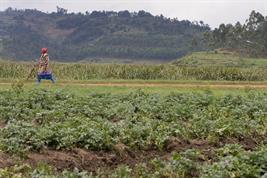
A Memorandum of Understanding between FAO and Leibniz Centre for Agricultural Landscape Research (ZALF) will strengthen evidence-based actions to improve agricultural landscapes for sustainable soil and nature resource management, preserving biodiversity and raising food security and nutrition.
On 29th September, 2021 the
Food and Agriculture Organization of the United Nations (FAO) and and Leibniz Centre for Agricultural Landscape Research (ZALF) entered into partnership to bolster food security and nutrition and reduce poverty by fostering nutrition-sensitive agriculture.
Recognizing the linkages between healthy and diverse landscapes and food security and nutrition, FAO and ZALF have signed a Memorandum of Understanding to exchange knowledge and expertise, develop innovative methodologies and share data in areas ranging from food-based dietary guidelines, soil and water management, rural advisory services to sustainable bio-energy.
The partnership is based on a history of successful collaborations including FAO’s support to ZALF’s Scaling-up Nutrition (Scale-N), a three-year project on implementing potentials of nutrition-sensitive and diversified agriculture to increase food security of the population in rural Tanzania. Following the Scale-N project, in 2018 ZALF seconded an expert to FAO which provided additional expertise to FAO’s ongoing nutrition programmes. More recently, ZALF participated in the FAO workshop on Integrating Nutrition in Agriculture Extension that took place in June 2020. In addition to collaborations on nutrition-sensitive agriculture, FAO and ZALF have collaborated on soils management, Farmer Field Schools and on the High-Level Panel of Expert of the Committee on Food Security on agroecological approaches for sustainable agriculture and food systems to enhance food security and nutrition.
Going forward, the partnership will mobilize technical knowledge exchange on food consumption data for the
FAO/WHO GIFT Project and
Food-Based Dietary Guidelines, support development of the methodological approach for improving and assessing soil and water quality-agroecology-nutrition integration, promote sharing of knowledge and expertise to strengthen capacities for
Rural Advisory Services utilizing methodologies such as
Farmer Field Schools to contribute to nutrition-sensitive agriculture and food systems, and capacity development in wood energy and energizing food processing.
“ZALF and FAO share a wide range of priorities and complementary strengths which in partnership forge science-based and participatory approaches to promote nutrition-sensitive agriculture. For countries to adopt a food systems approach to improve nutrition, actors at all levels need to engage in a participatory manner and interventions must be based on best data and evidence available. FAO has been working to make evidence and data accessible to its Members and to develop capacities in participatory approaches. ZALF complements this pathway with their expertise and experience in low- and middle-income countries. Beyond nutrition-sensitive agriculture, the ZALF and FAO partnership will contribute to sustainable food production and consumption, and food security and better nutrition in conflict areas, among others towards achieving the Sustainable Development Goals”, declares Nancy Aburto, Deputy Director, Food and Nutrition Division (ESN) of FAO.
Against the backdrop of globalization, population growth and climate change, sustainable strategies for ensuring food security are essential. The Working Group “Sustainable Land Use in Developing Countries” of the Leibniz Centre for Agricultural Landscape Research (ZALF), Germany will cooperate with FAO in several projects, covering different aspects of farming and nutrition. “Next to providing research data on dietary intake and supporting the further development of methodologies for sustainable food production and consumption, we will add our expertise in participatory, community based methods to FAO projects”, Constance Rybak, deputy head of the working group, affirms. In addition to that, FAO and ZALF agreed on supporting each other in their respective projects on sustainable and energy efficient food processing in Sub-Saharan Africa. Another area of cooperation covers identifying indicators and methods for environmental peace building and food security in Colombia. Constance Rybak highlights the need for site-adapted approaches to sustainable farming: “To ensure long-term viability of local food production, we include all relevant actors and aim to balance out social, economic and environmental aspects that are connected to nutrition sensitive agriculture and rural development.”
 Press Release as PDF file
Press Release as PDF file

Pictures
For downloading the pictures please click on a picture and use the icon.

